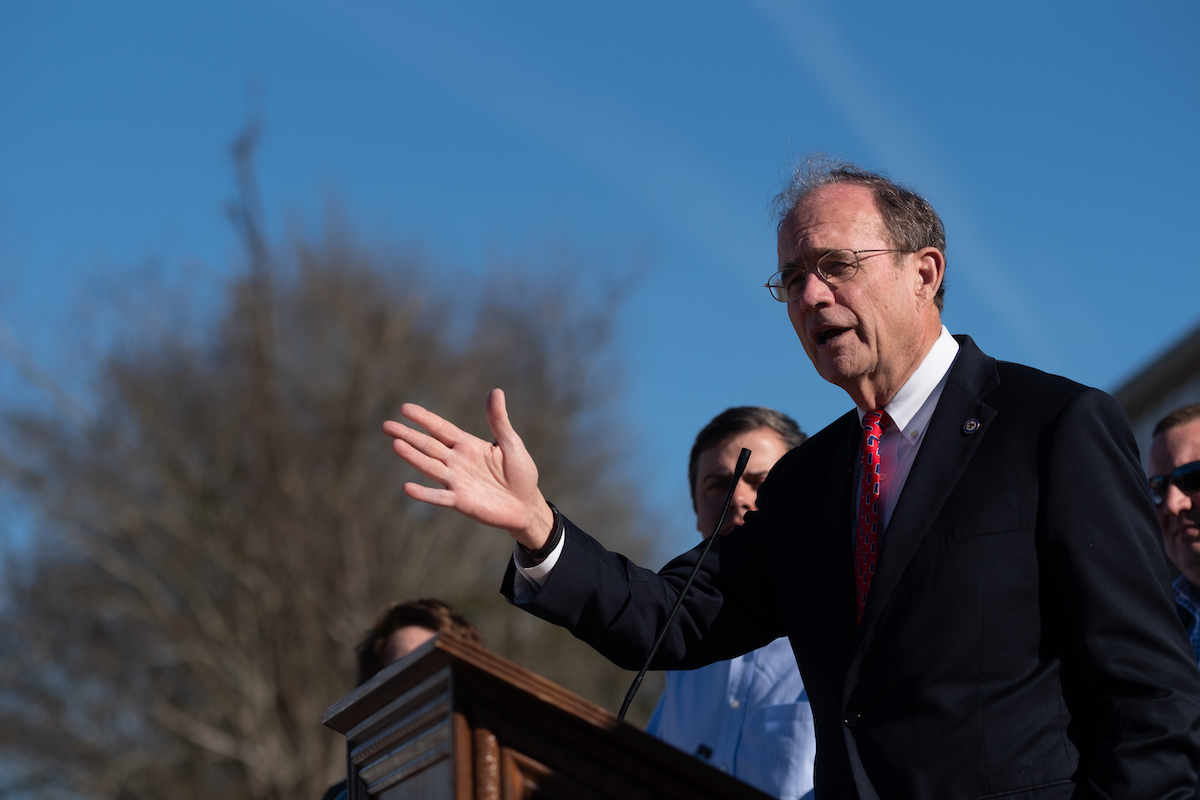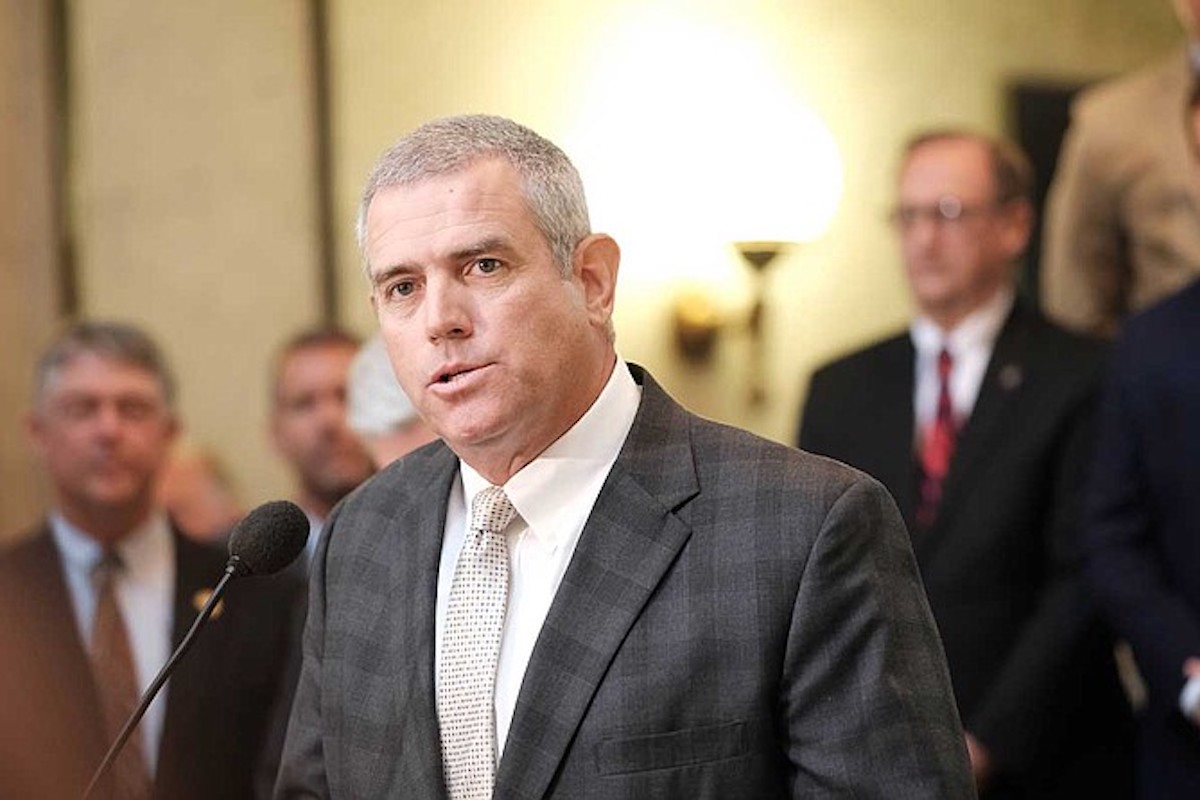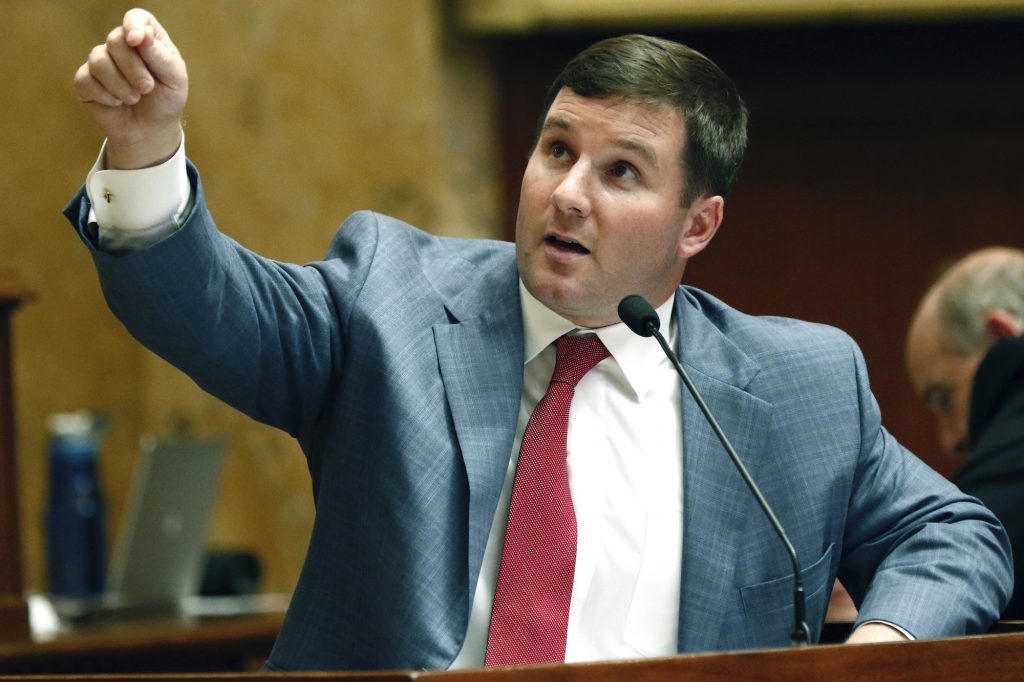More than half of working Mississippians would no longer pay state income taxes starting next year under a bill Republican House Speaker Philip Gunn touted today as “probably the most extraordinary policy change that we’ve ever done—at least in my book.” The plan calls for higher sales taxes overall, but cuts the current grocery tax rate in half.
“We are putting $1.9 billion back into the pockets of Mississippians,” Gunn said as he introduced House Bill 1439, the “Mississippi Tax Freedom Act of 2021.”
Starting in 2022, individuals making up to $47,700 and couples making up to $95,400 would no longer pay any income tax. The exemptions would increase yearly to include more Mississippians in higher income brackets, fully eliminating the state income tax within a decade.
With little warning, the GOP-led House Ways and Means Committee voted to advance the 308-page bill to the House floor last night and quickly rushed it to the House floor today, where lawmakers passed it by an 85-34 vote. Most Republicans voted for it along with a small number of Democrats.
The bill’s chances in the Senate, where Republican Lt. Gov. Delbert Hosemann presides as Senate president, are less certain. The upper chamber’s leader expressed skepticism of proposals to eliminate the state income tax last year, but House Republicans rolled a $1,000 teacher pay raise into the bill, essentially tying its fate to that of one of Hosemann’s top legislative priorities.
Public Education, Other Services in Danger, Group Says
Despite some cross-partisan support for the reform plan, the package is drawing opposition from an influential education group.
“This evening, House leaders sneaked in a bill that would strip nearly $2 billion from state coffers by eliminating the state income tax. HB 1439 would threaten a meaningful teacher pay raise, school funding, and other state services we rely on to keep us safe and productive,” the Mississippi Parents Campaign, a pro-public education lobbying group, said in a statement late Monday night.

“In a particularly offensive move, this year’s teacher pay raise was added to the tax cut bill, essentially holding the $1,000 teacher pay raise hostage to a bill that would almost surely eliminate the possibility of a more substantial pay raise next year or into the future.”
In his announcement at the Capitol today, though, Speaker Gunn said the bill would benefit educators. “Under this bill, a teacher who makes $40,000 a year would get a $2,500 pay raise immediately” by not having to pay a state income tax, he said.
The Clinton Republican said the state will make up for the $1.9-billion loss in revenue by increasing most “consumption” and “use” taxes. “Under this plan, we intend to replace that ($1.9 billion), so our goal is to keep the budget stable,” the Hinds County Republican said.
‘Control of the Tax in the Hands of the Consumer’
Gunn is a member of the American Legislative Exchange Council, or ALEC, where he served as chairman of the board of directors throughout 2020. ALEC, an Arlington, Va.-based pro-business organization made up of conservative lawmakers and corporate interests, drafts “model legislation” that often shows up in legislatures across the state. The corporate-funded nonprofit has long urged state lawmakers across the country to eliminate their states’ income taxes.
Under the proposed Mississippi tax overhaul, sales taxes would rise from 7% to 9.5% on most goods, including liquor and telecommunications services. Those purchasing mobile homes, aircraft and automobiles would pay a 5.5% sales tax instead of the current 3% sales tax. Sales taxes on manufacturing machinery, farm equipment and logging equipment would rise from 1.5% to 4%.

“That puts control of the tax in the hands of the consumer. Consumers will now have control of how they spend their dollars, which we strongly believe they know how to spend their money a whole lot better than government does,” Gunn said. “They control what kind of tax they want to pay, and if they don’t want to pay the sales tax on an item, they don’t have to buy the item.”
The tax-reform bill would also raise the sales tax on most tobacco products to 25%, up from the current 15% rate. The sales tax on a regular 20-pack box of cigarettes would also rise from 3.4 cents per cigarette, or 68 cents per box, to 5.9 cents per cigarette, or $1.18 per box. Under the bill, the state would use those funds to create a “Budget Stabilization Fund” to “further the purposes of” the Mississippi Tax Freedom Act of 2021.
Gunn said some of the ideas for the tax-overhaul bill came out of 2016 hearings at the Legislature when lawmakers were working on the largest tax cut in state history. Many Democrats criticized the bill, though, because it eliminated the state’s $260 million-a-year corporate franchise tax, securing a victory for big-business lobbyists even as the state, like now, struggled to fund and improve public services and infrastructure.
Democrats Like Some Provisions
This morning, Mississippi Democrats signaled tentative support for Speaker Gunn’s tax overhaul. At today’s announcement, the speaker introduced Rep. Robert Johnson, the Democratic House minority leader.
“I’ll tell you, as a Democrat, I keep looking at the bill, looking for the trojan horse, looking for the trick, because I don’t want to get in any trouble, but it sounds like something I would write,” the Natchez Democrat said today, provoking laughter from the crowd of mostly Republican lawmakers around him.
Democrats “are still looking at the bill,” Johnson said, noting they felt “encouraged” about “aspects of the bill we were concerned about.”
“That is, we didn’t want to see any cuts in the budget. We wanted it to be a wash, that way we were replacing money we were taking out,” he said. “We still need roads built, we still need teachers to have a pay raise, we still need infrastructure improvements.”

The bill, Rep. Johnson said, would be “a tax cut to working people” and “not a tax cut for big business.”
“In fact, I’m encouraged by the fact that there are people who have not been paying a requisite amount of tax, and now are going to be taxed that hadn’t been taxed before,” he said, pointing to the increased taxes on manufacturers and automobile dealers, who he noted currently “get taxed at a lower rate than other people in the state.”
Johnson cited the proposed grocery tax decrease as one of the bill’s highlights for Democrats, helping alleviate concerns about the disproportionate impact that a sales tax increase would have on the working class.
“We were concerned about the fact that the sales tax is the most regressive tax, but of that part of the sales tax, the most regressive part is the grocery tax. We agree that it needs to be cut. … So what I’m encouraged by is that this is a bill for working people in the state of Mississippi. And I’m going to continue to look at it.
“We’re going to meet today and people in my caucus are going to ready the bill, but what I’ll tell you right now is people in my caucus—their concerns are being addressed,” Johnson said.
Rep. Lamar: ‘Reward for Work’ Was ‘Main Issue’ of Civil War
On the House floor today, House Ways and Means Committee Chair Trey Lamar, a co-sponsor of the bill who led the effort to advance it out of committee yesterday, said the bill was about restoring the nation’s founding commitment to the “unalienable rights to life, liberty and the pursuit of happiness.”
“These rights are what we are here about today because with the shackles of unfair tax, there is less life, liberty and less pursuit of happiness,” said Lamar, who represents parts of Lafayette and Tate counties.
He then invoked the Civil War. The Union’s fight to dismantle the southern system of chattel slavery and to end the practice of owning human beings, Rep. Lamar told his fellow lawmakers today, was about ensuring just compensation for labor.
“During our nation’s darkest hour, President Lincoln spoke to a group of Union soldiers telling them what they were fighting to preserve. … They put everything on the line so that every American, regardless of their race, would have a reward for their work,” he said today. “Standing before those soldiers, President Lincoln said the right to have a reward for your work was the birthright of every American. That was the main issue of the war.”
In 1861, President Abraham Lincoln signed the Revenue Act, creating the nation’s first federal income tax.

About half an hour later, lawmakers passed the bill mostly along partisan lines with a few defections on either side, with Johnson voting for the bill.
During a press conference in Jackson today, Gov. Tate Reeves, a Republican, commented on the legislation, saying he thinks it “has a lot of good things in it” but disagrees with House Republicans’ decision to increase other taxes to make up for the $1.9 billion cut in revenue.
“I think the pieces of that particular plan that raise taxes on individuals are problematic. … I’m glad that more and more of my fellow Republicans are talking about the elimination of the income tax, and we’ll see where it goes from here,” he said.
The ‘Kansas Experiment’ and ‘Oklahoma Debacle’
The non-partisan Parents’ Campaign, though, is concerned about how similar tax system overhauls in other states have played out and, in its statement last night, cautioned that lawmakers are rushing the process and should look to other states whose experiences “paint a vastly different picture.”
“Former Gov. (Sam) Brownback promised Kansans the same thing when he pushed through the elimination of their state income tax in 2012-2013. It was a catastrophe. Ditto for the Oklahoma debacle,” the Parents’ Campaign said. “In the four years following the Kansas tax cut, the state suffered nine rounds of budget cuts, three credit downgrades, and what The Atlantic called ‘an ongoing atmosphere of fiscal crisis.’ School budgets and other state services were decimated. In 2017, facing a furious electorate, the Kansas Legislature waived the white flag and rolled back the tax cuts.”
Kansas Republicans based their 2012 reform package on ALEC-authored model legislation—legislation which Gov. Sam Brownback claimed in a May 2014 Wall Street Journalist op-ed would herald the dawn of “a midwest-renaissance rooted in the Reagan formula.”
Since that state ended its so-called “Kansas Experiment” in 2017, it has rebounded from its crippling budget deficits and, instead, began experiencing budget surpluses. As the state’s coffers fill back up once again, though, some Republicans in the Sunflower State have reignited a push to bring back some of the Brownback-era cuts.

In Oklahoma, lawmakers under both Democratic and Republican leadership have repeatedly passed cuts to the state income tax since 2004. By 2017, The Washington Post reported, “a deepening budget crisis” had “forced schools across the Sooner State to make painful decisions” with ballooning class sizes, cuts to art and foreign-language programs and children going without textbooks.
About one-fifth of Oklahoma’s public-school districts have now cut the school week from five days to four in order to keep classrooms open under severe budget strains.
“But funding for classrooms has been shrinking for years in this deep-red state as lawmakers have cut taxes, slicing away hundreds of millions of dollars in annual revenue in what some Oklahomans consider a cautionary tale about the real-life consequences of the small-government approach favored by Republican majorities in Washington and statehouses nationwide,” Washington Post investigative reporter Emma Brown wrote in 2017.
In its statement last night, the Parents’ Campaign cited an April 2017 Associated Press report that described a deteriorating situation in which “highway patrol troopers have been warned not to fill their fuel tanks, and drunken drivers have been able to keep their licenses because there are not enough administrative workers to revoke their driving privileges.”
Mississippi lawmakers, the Parents’ Campaign said, should heed warnings from residents and lawmakers in those states and take time to study the issue before passing a new reform.
“Our Legislature has been making important strides toward better teacher pay and stronger public schools. A massive and hastily devised income tax cut could reverse all of that progress, exacerbate our teacher shortage, and send us reeling backward,” the group said, adding that it would be “extremely dangerous to rush through a bill that could have a devastating impact on public schools, teacher pay, state troopers, public health, and other critical services.”
Hosemann: ‘It’s Not a Field of Dreams. I Don’t Print Money.’
The Parents’ Campaign raised concerns about an elimination of Mississippi’s state income tax last year after Gov. Tate Reeves released a budget plan that included his own proposal for eliminating the state income tax.
“Gov. Reeves claims that stripping away a full third of the state’s General Fund—and all the services those funds provide us—would somehow make our state more livable. He might want to take a lesson from Kansas. Former Gov. Brownback promised Kansans the same thing when he pushed through the elimination of their state income tax in 2012-2013. It was a catastrophe,” the group said in its Dec. 17 post.
At the time, the Parents’ Campaign expressed hope that the Mississippi Senate, led by Lt. Gov. Hosemann, would block such an effort. The post cited Hosemann’s interview that month with then-Jackson Free Press reporter Nick Judin, who is now the state reporter for the Mississippi Free Press, and his “refreshingly pragmatic” comments on the proposal.
“It’s a $2-billion dollar question. I am open to any solution to that. But, until we have a solution … it’s not Field of Dreams. I don’t print money,” Hosemann said at the time. “We have to have enough funds to pay for highway patrol, education, all the other things we pay for as a state.”
Correction: Democratic House Minority Leader Robert Johnson voted for the House Bill 1439. An earlier version of this story incorrectly stated that he voted against it.









